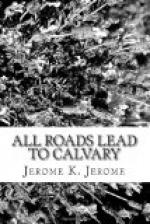“God knows I didn’t want it, speaking personally,” said a German prisoner one day, with a laugh. “I had been working at a printing business sixteen hours a day for seven years. It was just beginning to pay me, and now my wife writes me that she has had to shut the place up and sell the machinery to keep them all from starving.”
“But couldn’t you have done anything to stop it?” demanded a Frenchman, lying next to him. “All your millions of Socialists, what were they up to? What went wrong with the Internationale, the Universal Brotherhood of Labour, and all that Tra-la-la?”
The German laughed again. “Oh, they know their business,” he answered. “You have your glass of beer and go to bed, and when you wake up in the morning you find that war has been declared; and you keep your mouth shut—unless you want to be shot for a traitor. Not that it would have made much difference,” he added. “I admit that. The ground had been too well prepared. England was envious of our trade. King Edward had been plotting our destruction. Our papers were full of translations from yours, talking about ‘La Revanche!’ We were told that you had been lending money to Russia to enable her to build railways, and that when they were complete France and Russia would fall upon us suddenly. ’The Fatherland in danger!’ It may be lies or it may not; what is one to do? What would you have done—even if you could have done anything?”
“He’s right,” said a dreamy-eyed looking man, laying down the book he had been reading. “We should have done just the same. ’My country, right or wrong.’ After all, it is an ideal.”
A dark, black-bearded man raised himself painfully upon his elbow. He was a tailor in the Rue Parnesse, and prided himself on a decided resemblance to Victor Hugo.
“It’s a noble ideal,” he said. “La Patrie! The great Mother. Right or wrong, who shall dare to harm her? Yes, if it was she who rose up in her majesty and called to us.” He laughed. “What does it mean in reality: Germania, Italia, La France, Britannia? Half a score of pompous old muddlers with their fat wives egging them on: sons of the fools before them; talkers who have wormed themselves into power by making frothy speeches and fine promises. My Country!” he laughed again. “Look at them. Can’t you see their swelling paunches and their flabby faces? Half a score of ambitious politicians, gouty old financiers, bald-headed old toffs, with their waxed moustaches and false teeth. That’s what we mean when we talk about ‘My Country’: a pack of selfish, soulless, muddle-headed old men. And whether they’re right or whether they’re wrong, our duty is to fight at their bidding—to bleed for them, to die for them, that they may grow more sleek and prosperous.” He sank back on his pillow with another laugh.




